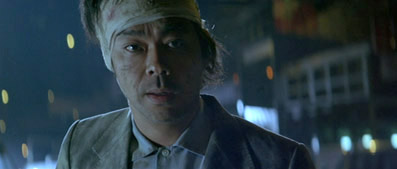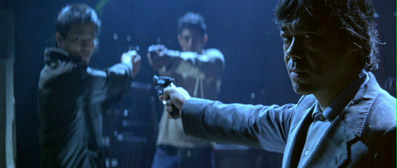|
It wasn't so long ago that I reviewed Mad Detective [Sun taam] for its UK cinema release, and watching it again my views on its strengths and small weaknesses remain unchanged, so for an overview of the film itself click here.
It's worth noting that the general reaction to the Wai Ka Fai and Johnnie To's decidedly offbeat detective drama has been largely positive, but with a few notable exceptions. The most prominent and unexpected of these, at least in this quarter, was the negative view put forward by the learned Tony Rayns in Sight & Sound – he found the film derivative, mediocre and even racist, and complained that it employed a mesh of confusing background detail to distract us from its insubstantial plot. I've no intention of writing a point by point response, in part because Mr. Rayns has seen far more Asian cinema than I probably ever will, but also because I really can see where he's coming from, at least to a point. Yes, the plot's a bit thin, but I'd also argue that plot is not the film's raison d'être, and far from being confused by some elements, I relished at being required to pay attention to the detail and not having plot points hammered home in the manner of so many mainstream American thrillers (witness the scene in the recent Mirrors where Keifer Sutherland reads all of the clues out loud as he goes through them to make sure even the sleepiest audience member can join the dots).

As ever, in the end it's down to personal taste, and we all tend to defend the movies we like and attack those that get up our noses on a factual rather than opinion basis, but opinion it always is. I've changed my mind on a second or third viewing before, but if anything the second viewing of Mad Detective provided pleasures that were not available on the first, the knowledge of just how Bun works and how he sees the world completely changing how I interpreted some sequences – his early in-store confrontation with a would-be thief is an excellent example. A second viewing also helped me connect some dots I wasn't even aware could be joined, and I'm still thinking about the gun placement permutations of the final shot.
Some will no doubt be surprised at seeing such a recent work, one that has yet to stand the test of time, being released under the Masters of Cinema label, which has previously specialised in restorations of classic and lesser seen films from years past. It certainly represents a new move for the label, but one that's in keeping with their world cinema ethos and is similar to the strategy taken by American restoration kings Criterion, who have occasionally broken with tradition to show support for new releases, the work of Wes Anderson in particular. Personally I think it's a welcome development, and, of course, it's also the label's first Blu-ray release. And so to...
The following is an experience open to you only if you have both the DVD and Blu-ray versions of Mad Detective at your disposal. Pop the DVD in your upscaling DVD player and play a few scenes on your 42" plasma and appreciate the clarity, colour integrity and reasonable detail levels. Now put the Blu-ray disc in and watch the same sequences and you'll immediately appreciate the difference. Fear not, the picture quality on the DVD, particularly if played on a large CRT TV without upscaling, is very impressive. But the Blu-ray really does leave it standing. Sharpness, or rather viewer perception of it, may vary a little depending on the content, lighting, contrast and even camera movement of the shot in question, but when all these elements are favourable (the static wide shot as Bun's wife enters the restaurant that she once frequented with her husband or the high-angle shot of a red taxi pulling up beside a blue car at night), the results are every bit as gorgeous as the packaging claims. The level of detail is excellent – the are a couple of facial close-ups where this leaps out of the screen at you – and at its best the contrast is crisp without loss of shadow detail and the colours are vibrant without over-saturation. It should be noted, however, that there are some variations in contrast on both discs, with black levels greying out a little on some shots.

The DVD offers a choice of Dolby 2.0 stereo and Dolby 5.1 surround, while the Blu-ray disc offers Dolby Digital 2.0 stereo, Dolby TrueHD 5.1 and DTS-HD Master Audio surround. The packaging also lists a standard Dolby 5.1 track – originally I noted that this was absent, but it has been pointed out to me, as an HD newbie, that when connected to a non-HD compatible amplifier this track sends a regular 5.1 surround track. All of the tracks sound good, boasting the sort of clarity and dynamic range you'd expect from a modern movie, but the prize has to go to the DTS-HD Master Audio track, whose sometimes crystal clarity is lovely even on a non-HD sound system, particularly its reproduction of French composer Xavier Jamaux's low key score. The full sound stage comes to life for location atmospherics, and the surrounds are intermittently lively, prividing a real jump when Ho is almost run down by a truck, the roar of its engine hurtling past you to join the vehicle as it appears on screen. Bass has considerable kick on the 5.1 and especially the DTS track, with everything from the slamming of a fridge door to the beating of a body sending a lower frequency wallop through the room. The only hint of an issue is a very slight distortion of the high end of Bun's wife's voice when she yells, a crispness that is more obvious on the clarity of the DTS track. Other than that, first rate.
For the record, even the subtitles are considerably sharper on the Blu-ray disc, with not a sign of the jagged edges we are used to seeing.
The included grabs, by the way, are from the DVD version.
The extra features are identical on the DVD and Blu-ray editions of the release. All have optional English subtitles and all are standard resolution 480p on the Blu-ray disc.
Q&A with Johnnie To (33:10)
Conducted at Cinémathèque Française in Paris on 5th March 2008, director To introduces a screening of his 1999 The Mission [Cheung fo], part of a thirty-film retrospective of his work, and engages in a Q&A with the presenter and audience afterwards. To provides interesting responses to some useful questions, covering his early years in TV, his ability to shoot Hong Kong at night and his attitude to real-life criminal gangs in Hong Kong. He claims that as a director he's no good at writing scripts, and gives an insight into past attitudes in the Hong Kong film industry when he reveals that his rare casting of three female leads (Michelle Yeoh, Anita Mui and Maggie Cheung) in his 1993 The Heroic Trio [Dung fong saam hap] was governed in part by the fact that he could hire three actresses for the price of a single actor. An intriguing final sequence watches on as To patiently signs autographs and poses for pictures with just about everyone at the screening. Mad Detective gets only a passing mention here. The Q&A is conducted in French and Cantonese with English subtitles, with jump wipes used to remove the verbal translations done for the audience, which would have been redundant here given the presence of (optional) subtitles.
Cast Interviews (15:59)
A slightly misleading title for what is actually a single interview with actors Lau Ching Wan and Lam Suet, conducted in what looks like a reception area at the 10th Far East Film Festival in Udine, Italy in April of this year. Lau does most of the talking, covering his switch from drama to comedy and then back again, the increasing collaboration between the Chinese and Hong Kong film industries, preparing for the role of Bun in Mad Detective, and quite a bit more. Both actors talk about their approach to roles and whether they'd like to move on to directing, and Lau suggests that asking him to discuss his approach to his craft in any detail is akin to asking David Copperfield to reveal the secrets of his famed trickery.
Johnnie To interview (20:58)
A casually filmed interview with To, conducted in the Hotel Scribe in Paris in March 2008. Wearing sunglasses and sporting a cigar, To really looks the international movie director here, but the interview provides further background on his career, including his working relationship with Hark Tsui, his approach of writing scripts as he films them, and the importance of enjoying the filmmaking process. Regular actor Suet Lam also gets a mention, To claiming that "he represents the mischievous side of me well" and that he "decorates and brightens" his films.
UK Theatrical Trailer (2:17)
Not the slickest sell on the block, but particularly useful on the Blu-ray disc for picture quality comparison purposes with the 1080p main feature.
Booklet
A little anaemic by usual MoC standards, but then we're dealing with a new film that has yet to attract the sort of analytical essays that will only come with time. We do have one, by David Bordwell, who is the Jascques Ledoux Professor of Film Studies at the University of Wisconsin-Madison, and it's a goodie, capturing well what made the film work for me and offering an effective response to those slightly more negative reviews.
It's always good when positive first impressions are confirmed, and as stated above, a second viewing brings its own rewards as well as confirming what was so enjoyable the first time round. Mad Detective may be a little light on plot, but it's still a smart, stylish film that makes you work a little and is all the better for it. Being a recent work there are no damage repair or lost elements to excuse, and as such it's a fine choice for Masters of Cinema's first step into Blu-ray, and believe me, if you have a Blu-ray player then this is the version to go for, despite the quality of the DVD transfer. I am left with one small question, though: as with their DVDs, MoC are numbering their discs in order of release, but despite being their first Blu-ray disc (or the first I'm aware of), Mad Detective is labelled as #2. So, in the spirit of The Prisoner I just have to ask – who is number one?
|